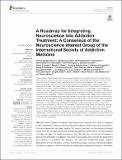A roadmap for integrating neuroscience into addiction treatment : a consensus of the Neuroscience Interest Group of the International Society of Addiction Medicine
Abstract
Although there is general consensus that altered brain structure and function underpins addictive disorders, clinicians working in addiction treatment rarely incorporate neuroscience-informed approaches into their practice. We recently launched the Neuroscience Interest Group within the International Society of Addiction Medicine (ISAM-NIG) to promote initiatives to bridge this gap. This article summarizes the ISAM-NIG key priorities and strategies to achieve implementation of addiction neuroscience knowledge and tools for the assessment and treatment of substance use disorders. We cover two assessment areas: cognitive assessment and neuroimaging, and two interventional areas: cognitive training/remediation and neuromodulation, where we identify key challenges and proposed solutions. We reason that incorporating cognitive assessment into clinical settings requires the identification of constructs that predict meaningful clinical outcomes. Other requirements are the development of measures that are easily-administered, reliable, and ecologically-valid. Translation of neuroimaging techniques requires the development of diagnostic and prognostic biomarkers and testing the cost-effectiveness of these biomarkers in individualized prediction algorithms for relapse prevention and treatment selection. Integration of cognitive assessments with neuroimaging can provide multilevel targets including neural, cognitive, and behavioral outcomes for neuroscience-informed interventions. Application of neuroscience-informed interventions including cognitive training/remediation and neuromodulation requires clear pathways to design treatments based on multilevel targets, additional evidence from randomized trials and subsequent clinical implementation, including evaluation of cost-effectiveness. We propose to address these challenges by promoting international collaboration between researchers and clinicians, developing harmonized protocols and data management systems, and prioritizing multi-site research that focuses on improving clinical outcomes.
Citation
Verdejo-Garcia , A , Lorenzetti , V , Manning , V , Piercy , H , Bruno , R , Hester , R , Pennington , D , Tolomeo , S , Arunogiri , S , Bates , M E , Bowden-Jones , H , Campanella , S , Daughters , S B , Kouimtsidis , C , Lubman , D I , Meyerhoff , D J , Ralph , A , Rezapour , T , Tavakoli , H , Zare-Bidoky , M , Zilverstand , A , Steele , D , Moeller , S J , Paulus , M , Baldacchino , A M & Ekhtiari , H 2019 , ' A roadmap for integrating neuroscience into addiction treatment : a consensus of the Neuroscience Interest Group of the International Society of Addiction Medicine ' , Frontiers in Psychiatry , vol. 10 , 877 , pp. 1-23 . https://doi.org/10.3389/fpsyt.2019.00877
Publication
Frontiers in Psychiatry
Status
Peer reviewed
ISSN
1664-0640Type
Journal item
Collections
Items in the St Andrews Research Repository are protected by copyright, with all rights reserved, unless otherwise indicated.

